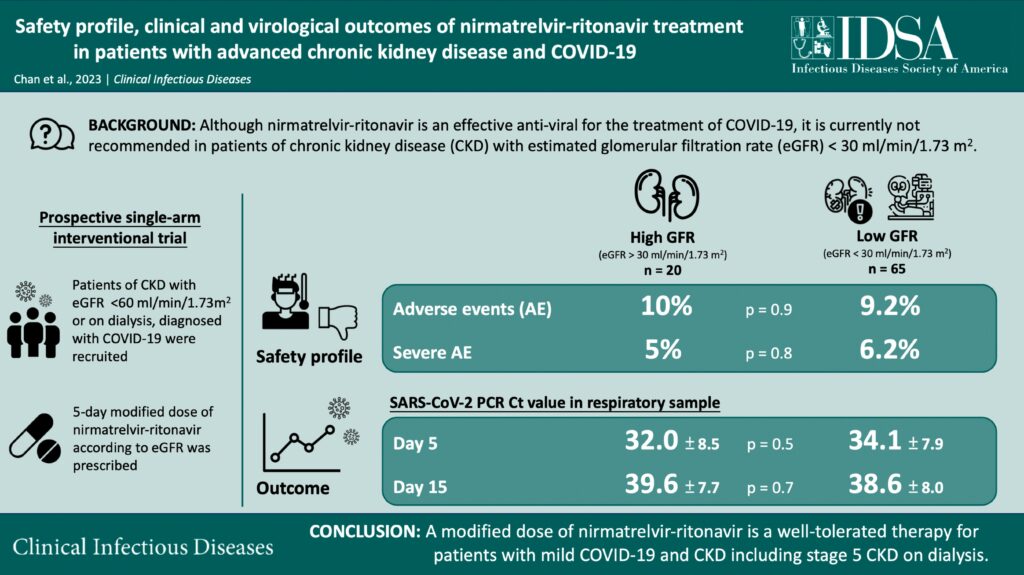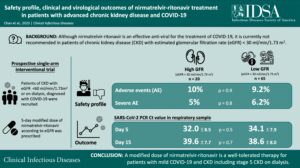CUHK
News Centre
CUHK-PWH research confirms Paxlovid can benefit patients with severe kidney disease
COVID-19 can cause serious harm among patients with severe kidney disease. However, current treatment guidelines do not recommend oral antiviral drug Paxlovid (nirmatrelvir/ritonavir) for patients with kidney function of less than 30%. A recent study by The Chinese University of Hong Kong (CUHK)’s Faculty of Medicine (CU Medicine) and the Prince of Wales Hospital (PWH) found that with dosage adjustment according to their renal function, 94% of patients with chronic kidney disease could successfully complete Paxlovid treatment. Among them, around 64% showed a high level of virus reduction, while the side effects were similar to those in the general population. The research results have been published in the renowned international medical journal Clinical Infectious Diseases.
About 2% of dialysis patients died from COVID-19
Oral antiviral drugs are recommended to treat patients with risk factors for severe COVID-19. Currently, the most effective oral antiviral drug is Paxlovid, which is proven to reduce the risk of hospitalisation, severe disease and death in patients.
Unfortunately, the current treatment guidelines do not recommend Paxlovid for patients with kidney function of less than 30%. On the other hand, COVID-19 can pose even more serious harm among patients with severe kidney disease than in the general population. Previous research by CU Medicine, as reported in the Hong Kong Medical Journal, showed that about 2% of dialysis patients died from COVID-19 during the fifth wave of the pandemic.
In view of this treatment gap, the CU Medicine-PWH research team saw an urgent need to study dosage adjustment of Paxlovid according to kidney function, with a view to benefiting the vulnerable group of patients who have severe kidney disease and are infected with COVID-19.
Paxlovid treatment effectively suppress the viral load with a favourable safety profile
Dr Chow Kai-ming, Clinical Associate Professor (honorary) in the Department of Medicine and Therapeutics at CU Medicine and Chief of Service in the Department of Medicine and Therapeutics at PWH, who led the investigation, prospectively followed and analysed 85 COVID-19 patients who were taking Paxlovid. Among them, 65 had kidney function of less than 30% and 59 were on long-term dialysis. The team treated the patients with Paxlovid, dose adjusted according to their renal function, closely monitoring the treatment’s effects and disease trajectory.
The study found that 94% of patients could successfully complete the treatment, and their viral load was confirmed to be significantly reduced on the fifth day and the 10th day. On the fifth day after Paxlovid treatment, 63.8% of the patients with kidney disease showed a high level of virus reduction (nucleic acid Ct value higher than 30). In addition, the side effects of Paxlovid in patients with kidney disease were similar to those in the general population (5-6.2%); no patients died during this study.
Dr Chow stated, “Our study provides new insights for the clinical management of COVID-19 patients with severe kidney disease. Paxlovid should be considered for use in patients with chronic kidney disease, including end-stage kidney disease patients who are on dialysis.”

A recent study by CU Medicine and PWH finds that with dosage adjustment according to their renal function, 94% of patients with chronic kidney disease could successfully complete Paxlovid treatment. Among them, around 64% showed a high level of virus reduction, while the side effects were similar to those in the general population.
Research team members include Honorary Clinical Associate Professors Dr Chow Kai-ming (1st from right) and Dr Grace Lui Chung-yan (1st from left), Honorary Clinical Assistant Professors Dr Gordon Chan Chun-kau (2nd from right) and Dr Timothy Li Chun-man (3rd from right), and Research Assistant Ms. Catherine Cheung Siu-king (3rd from left) from the Department of Medicine and Therapeutics and Honorary Clinical Assistant Professor Dr Ryan Sze Kin-ho (2nd from left) from the Department of Microbiology at CU Medicine.






